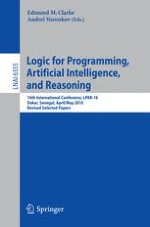This book constitutes the thoroughly refereed post-conference proceedings of the 16th International Conference on Logic for Programming, Artificial Intelligence, and Reasoning, LPAR 2010, which took place in Dakar, Senegal, in April/May 2010. The 27 revised full papers and 9 revised short papers presented together with 1 invited talk were carefully revised and selected from 47 submissions. The papers address all current issues in automated reasoning, computational logic, programming languages and deal with logic programming, logic-based program manipulation, formal methods, and various kinds of AI logics. Subjects covered range from theoretical aspects to various applications such as automata, linear arithmetic, verification, knowledge representation, proof theory, quantified constraints, as well as modal and temporal logics.
